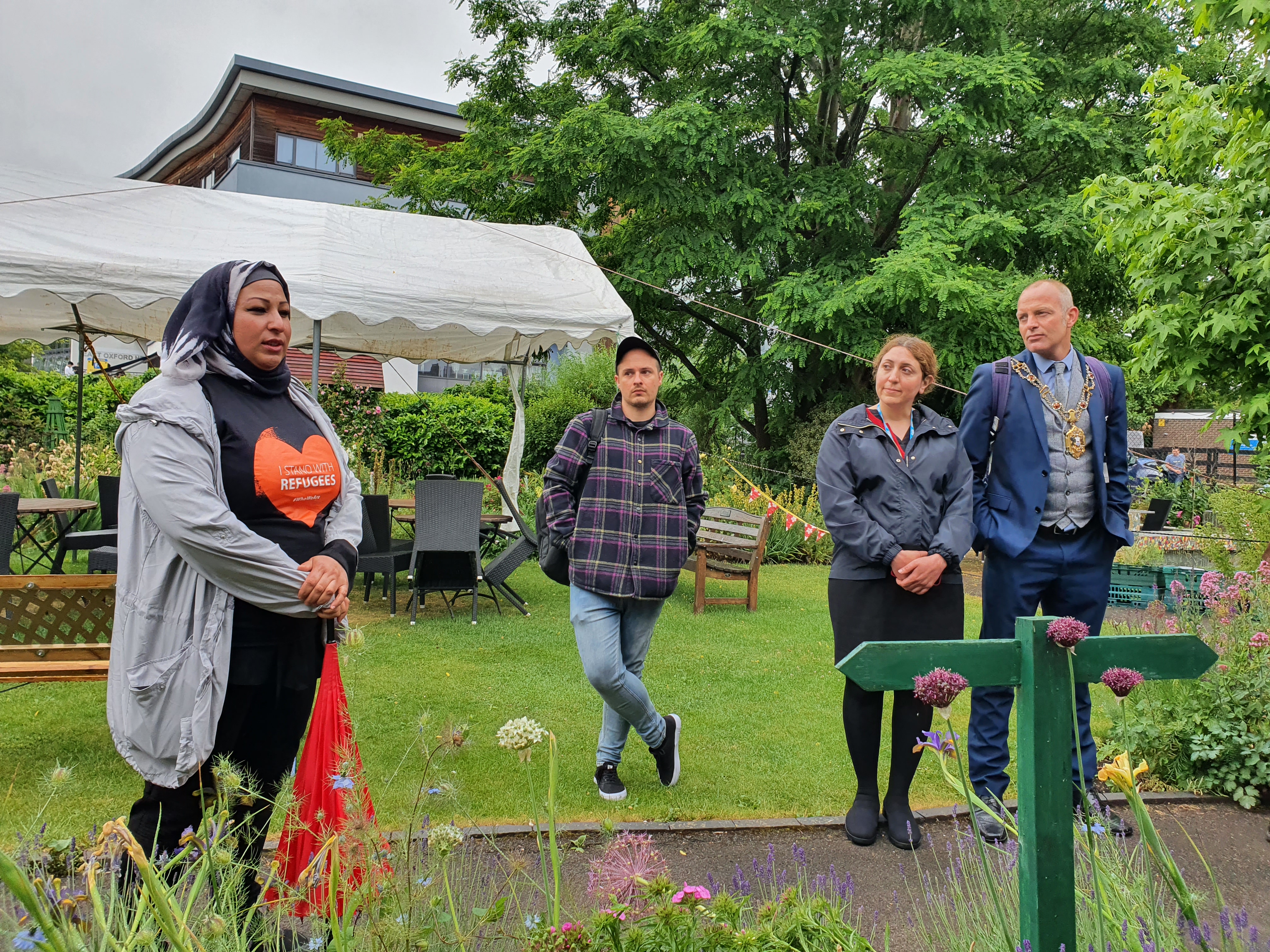Turning practice into policy
Getting a local refugee charity more involved in advocacy
Mark Goldring, Director of Asylum Welcome
15 July 2021
Getting a local refugee charity more involved in advocacy
Mark Goldring, Director of Asylum Welcome
15 July 2021

Asylum Welcome team and volunteers
Having worked at national charities well known for their advocacy and campaigning work and learned from some outstanding practitioners, I was clear when joining Asylum Welcome last year that I saw advocacy as a significant part of our role. It’s important for us to use our extensive practical experience to help improve the policy and practice that impacts our clients, not just to accept the status quo and help them to live with it. With the new Nationality and Borders Bill, which seriously damages the rights of asylum seekers in the UK, now being proposed, advocacy feels more important and urgent than ever.
But what does advocacy mean for a small, local refugee charity such as Asylum Welcome? Based in Oxford, we have a small staff, tight budget, a substantial but very part time volunteer team and a demanding set of practical activities to deliver daily. These give us great insight and experience that we can use to influence policy.
The first thing to recognise is that for refugees, as with many of the people needing support in the U.K., some policy is shaped nationally and some locally. We need to work at both levels.
At a local level, we’ve always been very good at fighting for specific clients to be housed, fed or otherwise supported. We have campaigned to close down a detention centre close to the city and from time to time on issues ranging from free transport to creating a City of Sanctuary.
We recognised that we needed to look again at the range of policies and funding that affect refugees today. This involves seeking to make sure refugees are considered in terms of specific targeted services, but also that decision makers across all services, including but not only housing, education and health, consider their distinct needs. This approach involves improving relationships with and increasing awareness of individual officials and councillors, as well as contributing to formal processes. It’s time consuming. It is easy to think we are doing well because we have a few supportive councillors, but then ignore the officials who support them- or vice versa. We also regularly need reminding that there are six local authorities in our catchment area, not just the one in the city in which we are based.
As well as using more traditional methods, last month we organised a guided tour of the less visited parts of the city led by refugees. We were able to show councillors, the Lord Mayor and other civic leaders the activities, organisations and institutions that are important to refugees and bring out the realities of refugees’ lives that they can help improve.
Some of our work is not directly about changing specific policies but is about building broader public awareness and support to influence behaviour. Most people respect the refugees they actually know, but many are worried about “all the other ones”. Influencing societal behaviour is a tough ask for a small organisation and we can’t achieve much on our own. But we can lead, and we are seeing that our supporters want to show that they care. Having refugees tell their stories in the media, having supporters display “orange hearts” in their windows, having supporting speakers in schools and churches are all part of these efforts to show support and that local people care.

We have two big universities in our city. Helping some of the colleges become Universities of Sanctuary makes a practical difference. Along with working with student groups, this can help mobilise resources and campaigning activity, local and national.
We have put work into strengthening partnerships with local refugee and diaspora community organisations to help them directly influence local policy and contribute to the national. This includes multilingual consultations on our response to the Borders Bill. At a more immediate level, it involved an Arabic speaking doctor phoning our clients to try and break down fear and barriers to the Covid vaccine, while at the same time we worked with health providers to increase access for non registered patients.

At a national level, we know that one small local agency can’t make a difference on our own. But it is at the national level where the biggest threat currently is.
We try to work within national networks and coalitions, bringing our experience, local case studies, witnesses and supporters to join with likeminded organisers across the country. There are long-standing and important campaigns to improve the rights of asylum seekers and refugees, for example, to increase their right to work. But with new legislation now in Parliament, the most immediate challenge is to stop things from getting worse.
In the Spring, we mobilised supporters and likeminded organisations to contribute to the official consultation that preceded the draft Nationality and Borders bill. Despite the evidence, many presented and the expertise shared, the Government made none of the changes we all pushed for when it published the bill. But we’re not stopping here, we are stepping up our work as the bill is debated in Parliament. We are briefing MPs, mobilising letter writing, using local media, asking other organisations who have refugees among their interest groups to engage, building on our Orange Heart campaign. We have found several national coalitions and networks eager to use and share material that we generate, so giving our local efforts greater reach.

Muradi, Asylum Welcome client, sharing her experience at Restore
It’s easy for an experienced director to speak to the media, that can be a lot more challenging for a refugee who is still worried about their status, and where English is a second or third language. But it’s more respectful and indeed much more effective to help people speak for themselves. We work hard to support this. We recently had a local radio journalist so moved by an interviewee that she carried on talking about what she’d heard long after the item had finished. We know we have further to go in this respect and need to start a proper training and support programme to better listen to and give voice to our clients.
Our early efforts to build our advocacy programme last year were a clear reminder of the fact that this work takes staff time and needs resourcing. All staff need to engage with it, and much of the value of our contribution is that it is grounded in the experience of individual staff and clients. But this adds to everyone’s workload, and we learnt that if it’s everybody’s job, it’s nobody’s. We now have a part time advocacy officer; her role in engaging, supporting, shaping and reaching out, externally and internally is essential. Volunteers and other staff are invaluable in identifying stories, supporting clients, designing videos, delivering social media. But the director and coordinator must guide and facilitate this.
I think that we are contributing to some useful improvements locally. Are we making an impact nationally? I can’t claim we are yet. It’s going to be amazingly hard to get the government to listen, especially when they have such a large majority. But the issues at stake are too important not to keep trying. We will carry on working with others to contribute to these efforts. Our direct services are necessary and invaluable. But if we can also affect policy, and stop or at least improve the planned legislation, we can have a much bigger impact on the future of many more refugees.
Mark Goldring is Director of Asylum Welcome, the Oxford based refugee charity, supported by the Lloyds Foundation. He was formerly CEO of Oxfam, Mencap and VSO.

With the new Nationality and Borders Bill, which seriously damages the rights of asylum seekers in the UK, now being proposed, advocacy feels more important and urgent than ever.